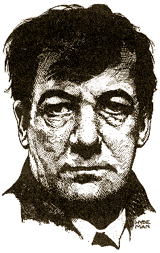-
|

|
Chapter 7: Early 20th C. American Lit
and Modernism
Sherwood
Anderson
1876-1941
|
©
Paul P. Reuben
September 13, 2019
E-Mail
|
Page Links: |
Primary
Works |
Selected
Bibliography 1980-Present
| Study
Questions |
MLA Style
Citation of this Web Page
|
Site
Links: |
Chap.
7: Index | Alphabetical
List
| Table
Of Contents
| Home
Page |

"I will be a
servant to words alone." - SA
An excellent
storyteller, Anderson seems to be preoccupied by a need to describe
the plight of the "grotesque" - the unsuccessful, the deprived, and
the inarticulate. He sensitively describes poverty and eccentricity.
His simple style, in the oral tradition of storytelling, influenced
writers like Hemingway and Faulkner who, in 1956, acknowledged
Anderson as "the father of my generation of American writers and the
tradition of American writing which our successors will carry
on."
Primary
Works
Windy
McPherson's Son, 1916; Marching Men, 1917;
Winesburg, Ohio, 1919; The Triumph of the Egg (short
stories), 1921; Many Marriages, 1923; Horses and Men
(short stories), 1923; Dark Laughter, 1925; Death
in the Wood (short stories), 1933; Kit Brandon,
1936.
Sherwood Anderson's
Winesburg, Ohio. Ed. Ray L. White. Athens: Ohio UP,
1997.
American Spring Song:
The Selected Poems of Sherwood Anderson. Downs, Stuart. ed.
Kent, OH: Kent State UP, 2007.
Selected
Bibliography 1980-Present
Anderson, David D., ed.
Critical Essays on Sherwood Anderson. Boston: G.K. Hall, 1981.
PS3501.N4 Z57
- - -. Ohio: In Fact and
Fiction: Further Essays on the Ohio Experience. East Lansing:
Michigan SU, 2006.
Bassett, John E. Sherwood
Anderson: An American Career. Selinsgrove, PA: Susquehanna UP,
2006.
Buechsel, Mark. Sacred
Land: Sherwood Anderson, Midwestern Modernism, and the Sacramental
Vision of Nature. Kent, OH: Kent State UP, 2013.
Dunne, Robert. A New Book
of the Grotesques: Contemporary Approaches to Sherwood Anderson's
Early Fiction. Kent: Kent State UP, 2005.
Lindsay, Clarence. Such a
Rare Thing: The Art of Sherwood Anderson's Winesburg, Ohio. Kent,
OH: Kent State UP, 2009.
Papinchak, Robert A.
Sherwood Anderson: A Study of the Short Fiction. NY: Twayne,
1992. PS3501 .N4 Z76 1992
Rideout, Walter B. and
Charles Modlin. Sherwood Anderson: A Writer in America, Volume
1. Madison: U of Wisconsin P, 2006.
Spears, Timothy B.
Chicago Dreaming: Midwesterners and the City, 1871-1919.
Chicago: U of Chicago P, 2005.
Whalan, Mark. Race,
Manhood, and Modernism in America: The Short Story Cycles of Sherwood
Anderson and Jean Toomer. Knoxville: U of Tennessee P,
2007.
Study
Questions
1. At the end of "The Egg,"
Anderson's narrator writes, "I wondered why eggs had to be and why
from the egg came the hen who again laid the egg." Analyze the
multiple symbolism of the egg, what it comes to represent by the end
of the story, and how Anderson uses it to unify his narrative.
2. Paraphrase the above
quotation from "The Egg " as follows: "I wondered why stories had to
be and why from the story came the storyteller who again produced the
story." Each of the anthologized stories from Winesburg, Ohio
bears some relation to George Willard. Discuss the significance of
this relation, using the paraphrased quotation, if helpful.
3. Anderson and Cather were
contemporaries and each chose to write about regional life. Compare
and contrast the narrators of "The Egg" and "My Mortal Enemy." What
significance does the story each narrator tells have for the
narrator's own developing consciousness? What role does region play
in that developing consciousness?
4. Discuss "Death in the
Woods" as a story of initiation.
5. Discuss the symbolism in
"Death in the Woods." What is suggested by the narrator's comment
that "The running of the dogs may have been kind of death
ceremonial"? Comment on the almost mystical illumination that the
incident, the silent tableau, and the presence of death had for the
boy.
MLA Style
Citation of this Web Page
Reuben, Paul P.
"Chapter 7: Sherwood Anderson." PAL: Perspectives in American
Literature- A Research and Reference Guide.
URL: http://www.paulreuben.website/pal/chap7/anderson.html
(provide page date or date of your login).
| Top
|

